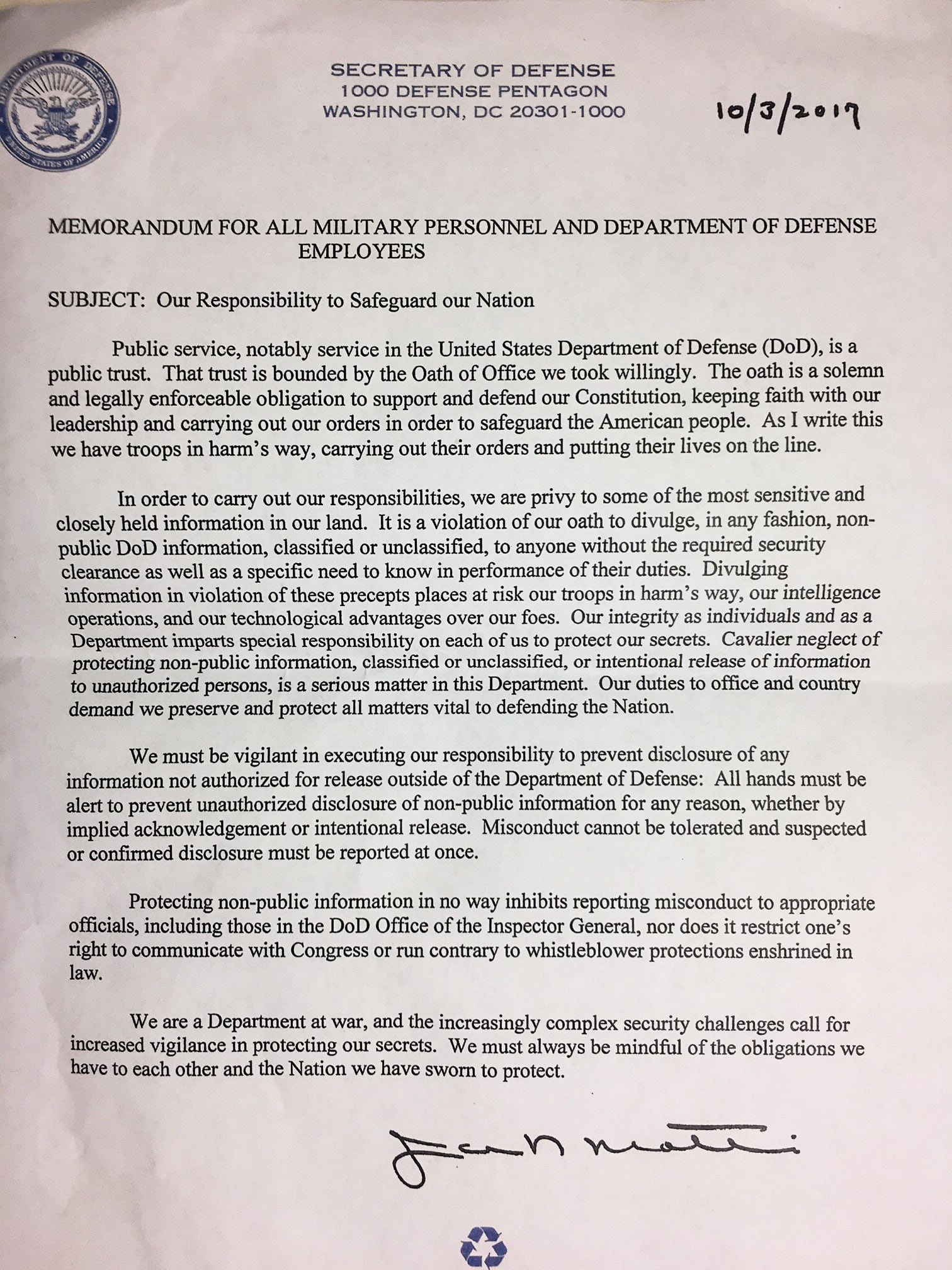WASHINGTON – Defense Secretary Jim Mattis issued a new warning Thursday to all military and Defense Department civilian personnel against information leaks, and directed personnel to report suspected leaks, guidance that government transparency advocates said would have a chilling effect on the public’s right to know.
In an internal memo dated Oct. 3 and obtained by the Military Times, Mattis reminded DoD personnel that “it is a violation of our oath to divulge, in any fashion, non-public DoD information, classified or unclassified, to anyone without the required security clearance as well as a specific need to know in the performance of their duties.”
Mattis also reinforced the obligation to report leaks.
“All hands must be alert to prevent unauthorized disclosure of non-public information for any reason, whether by implied acknowledgment or intentional release. Misconduct cannot be tolerated and suspected or confirmed disclosure must be reported at once,” Mattis wrote in the signed memo.
Transparency advocates warned that the memo could lead to increased government secrecy, because of the emphasis it also placed on not releasing non-public, but still unclassified DoD information.
Non-public, but unclassified DoD information can include documents such as internal memos, trip itineraries or administrative guidance that the Pentagon decides it does not want in the public realm, even if the information is not sensitive enough to classify.
That information is shielded by labeling it “sensitive but unclassified,” or “for official use only.” While not classified, those categories can result in government employees being disciplined for releasing the information, said Freedom of Information Act attorney Mark Zaid.
However, those categories are not well-defined, and create a gray area of what is releasable, said Liz Hempowicz, policy counsel for the Project on Government Oversight.
Mattis’ memo, she said, “will have a chilling effect on people, it creates a doubt on ‘What can I do with this information?’” Hempowicz said.
Zaid said both President Donald Trump and former President Barack Obama increased the amount of information that now falls into non-public but unclassified categories.
“This has been the trend in the last decade or so as new categories of classification — like sensitive but unclassified,” were more frequently used, Zaid said.
The documents can still be subject to U.S. Freedom of Information Act requests, Hempowicz said.
“If this information was supposed to be classified it would be,” Hempowicz said. “It’s not like we have an underclassification problem.”

Defense officials said Mattis decided to release the memo after a series of incidents where leaks hampered operations, including the May 2017 release of the suspect’s name in the Manchester, England, concert attacks by other unnamed U.S. officials. In that instance, Britain temporarily ceased sharing intelligence due to the leak.
However, defense officials were not immediately able to name any military operations where leaks had put U.S. service members at risk.
“No single incident triggered this,” said Pentagon spokesman Army Maj. Audricia M. Harris.
Harris said the memo is not intended to have a broader chilling effect.
“The purpose of this memo is to reinforce behavior to protect information, which may put our most valued asset at risk,” Harris said. “This in no way prevents DoD from sharing information in a timely fashion with the public.”
Tara Copp is a Pentagon correspondent for the Associated Press. She was previously Pentagon bureau chief for Sightline Media Group.





